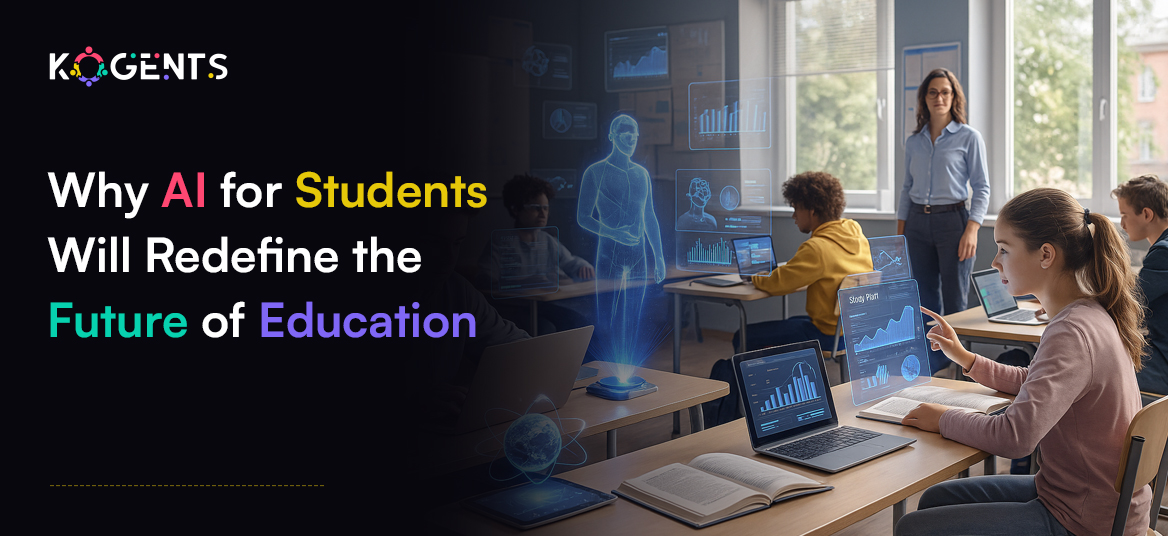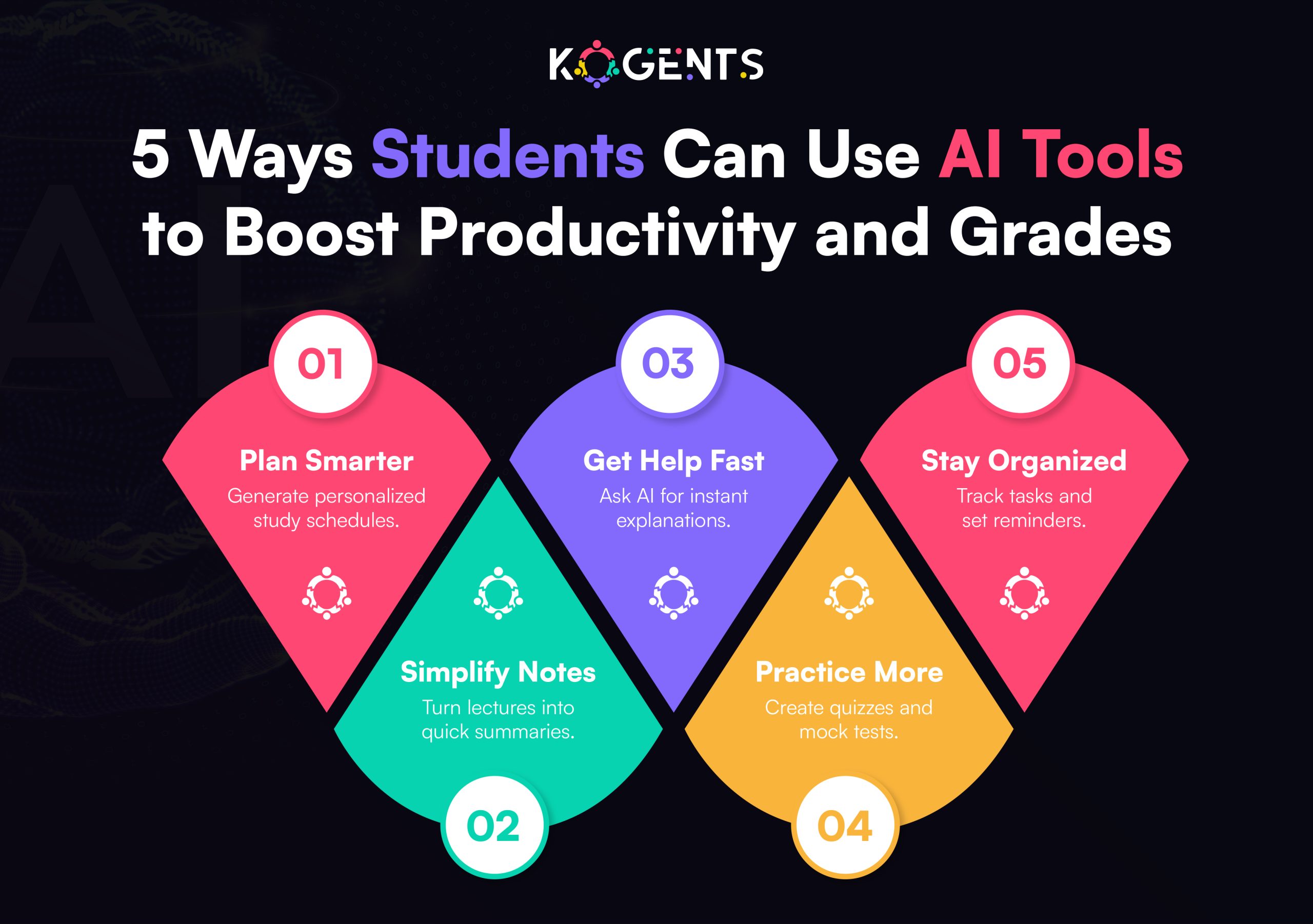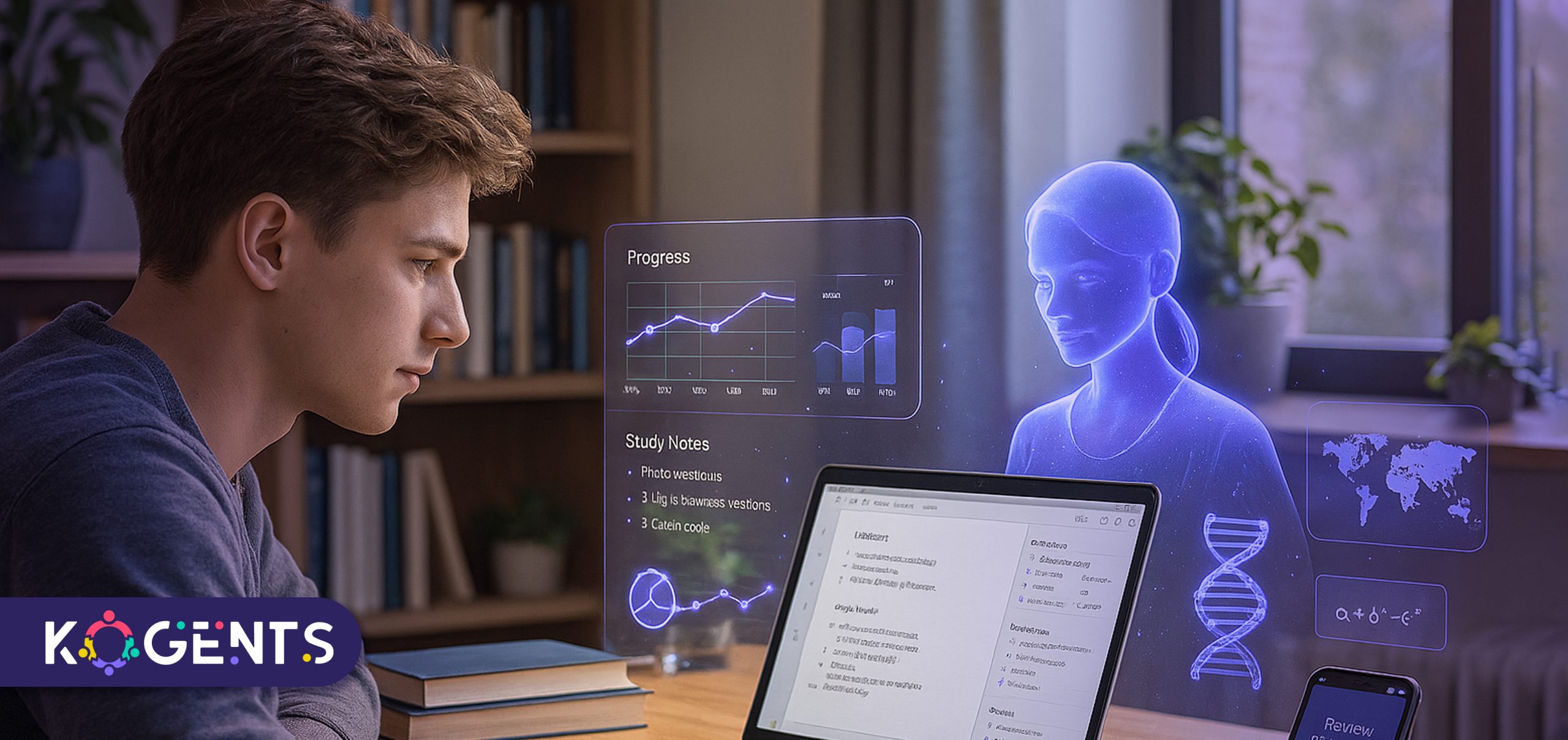Why AI for Students Will Redefine the Future of Education

Summary:
AI is no longer a buzzword; it’s a foundational force reshaping industries, workflows, and lives. Nowhere is that impact more transformative than in education. From AI tools for students that automate study plans to AI-powered learning for students that adapts in real-time to individual skill levels, the shift is seismic.
Entrepreneurs, solopreneurs, and educators are rethinking learning models, and student AI applications are redefining how learners engage with knowledge. The traditional model of one-size-fits-all classrooms is giving way to personalized learning powered by intelligent tutoring systems and generative AI for students.
This blog explores how AI for students is not just another EdTech trend but a structural transformation of learning. We’ll break down what AI agents are, how they operate, and why entrepreneurs, solopreneurs, and educators should be paying close attention.
Key Takeaways
- Understanding how AI is transforming classrooms with personalized, data-driven learning.
- Learning the difference between reactive and proactive AI agents and how they support students.
- Exploring the benefits of AI for entrepreneurs, solopreneurs, educators, and students.
- Recognizing the core features of AI in education, from study guides to gamification.
- Considering the challenges and ethics of using AI in learning environments.
What Are AI Agents in Education and Learning?
An AI agent for education is an autonomous or semi-autonomous system that performs tasks related to teaching, tutoring, and learning.
Think of them as AI tutors for students, guiding them through personalized paths, providing instant feedback, or handling repetitive instructional tasks. These agents use machine learning, natural language processing, and learning analytics to interpret inputs and deliver tailored educational experiences.
There are two primary categories:
- Reactive AI agents: Respond to student queries (e.g., AI homework help for students).
- Proactive AI agents: Analyze patterns and suggest next steps (e.g., AI study assistants recommending revision strategies).
Examples:
|
Note Key Points:
These agents are not limited to answering questions; they can generate
- custom study guides
- Monitor progress
- Identify learning gaps
- adapt to cognitive loads,
Why Entrepreneurs, Solopreneurs, and Educators Need AI Agents For Students?
For entrepreneurs and solopreneurs building educational tools, content, or tutoring platforms, AI agents are more than efficiency hacks; they’re business accelerators.
For Entrepreneurs
- AI educational tools for learners create scalable learning experiences without needing to hire 50 tutors.
- Embedded chatbots and AI learning support for students increase user retention and satisfaction.
- Use of learning analytics offers real-time insight into learner behavior, driving better product iteration.
For Solopreneurs
- Running a coaching or tutoring business? A student AI chatbot can respond 24/7, so you don’t have to.
- Build a micro-course with integrated AI study assistants, enabling personalized journeys without extra staff.
- Free up hours by automating feedback loops, grading, and content recommendations.
For Educators
- AI reduces cognitive load by automating admin tasks.
- Helps implement competency-based learning with adaptive modules.
- Supports AI literacy by modeling responsible tech use in classrooms.
ROI Highlights
|
How AI Agents Work in Education and Learning?
The core engine behind most student AI support systems is machine learning, specifically large language models (LLMs) like GPT-4, Gemini, or Claude.
These models process massive datasets, allowing them to:
- Understand context: Recognize what a student is asking.
- Generate content: Provide explanations, examples, or even exam questions.
- Adapt learning paths: Use adaptive education to adjust based on performance.
- Deliver feedback: Through text, audio, or video.
Key Workflows:
- Prompt Engineering: The quality of the input determines the quality of the output.
- Feedback Loops: Students interact, and the system adjusts its future responses.
- Learning Analytics Integration: AI agents are synced with LMS tools (like Moodle or Canvas) to monitor student progress.
Common Techniques Used:
- Natural Language Processing: For answering questions or summarizing notes.
- Computer Vision: For homework help via photo uploads (e.g., QANDA).
- Knowledge Graphs: To map concepts and suggest learning paths.
- Automated Formative Assessment: Real-time quizzes or tests that adapt to the user’s level.The global AI in education market reached $7.57 billion in 2025, up 46% from 2024.
Core Features of Modern AI Agents in Education
1. Personalized Learning Plans
AI dynamically generates individualized day-by-day study plans, customized learning content, pace, and structure to a student’s strengths, weaknesses, and goals.
2. Real-Time Tutoring Assistance
With student AI assistants, learners receive instant clarification and explanation of concepts in any subject area, making AI comparable to a personal tutor.
3. Study Guide Automation
AI converts complex chapters, lecture notes, or video content into digestible formats: bullet summaries, mind maps, or flashcards.
4. Intelligent Resource Curation
The agent finds the most relevant videos, articles, and interactive content to reinforce weak areas based on user behavior and knowledge gaps.
5. Multilingual and Accessibility Support
AI can translate materials, simplify vocabulary, and support learners with disabilities through voice, subtitles, and screen readers.
6. Gamification Mechanics
Motivational triggers like badges, learning streaks, point systems, and real-time progress bars drive long-term engagement.
7. Conversational Interfaces
With WhatsApp bots, web widgets, or app integrations, student AI chatbots are accessible anywhere, anytime.
8. Ethical Monitoring and Plagiarism Checks
Agents integrate with tools like Turnitin and Copyleaks to uphold academic integrity, detect AI-generated submissions, and suggest citations.
9. Data Dashboards for Instructors
Real-time analytics and visualizations help educators monitor cognitive load, engagement rates, and risk of dropout.

How AI for Students Will Redefine Education?
1. Scalability
A single AI agent can tutor thousands of students simultaneously, with consistent quality and responsiveness.
2. Availability and Convenience
AI agents are available 24/7, breaking the time, cost, and location barriers of traditional learning. Students in remote or underserved regions gain access to the same high-quality support.
3. Equity Education
By offering personalized support at scale, AI closes the achievement gap for students with different socioeconomic backgrounds or learning abilities.
4. Encouraging Meaningful Participation
AI introduces gamification, microlearning, and interaction loops that keep students focused and intrinsically motivated.
5. Teacher Empowerment
Rather than replacing educators, AI empowers them by automating grading, tracking, and content distribution, allowing more time for mentorship.
6. Impactful Learning Outcomes
Adaptive algorithms ensure learners focus on mastery rather than memorization, leading to higher retention and performance.
7. Cost Friendly
For educational institutions and solopreneurs, AI reduces the need for large administrative teams, manual tutoring, and customer support infrastructures.
Constraints and Considerations of AI in Education
1. Bias and Fairness
AI models can replicate and amplify biases present in training data, affecting grading, recommendations, or feedback, especially for marginalized groups.
2. Privacy and Data Protection
Student interactions are data-rich. Without strict compliance with FERPA, GDPR, and local school policies, institutions risk data misuse or breaches.
3. Over-reliance and Dependency
Some students may become overly dependent on AI tools, reducing opportunities to build independent problem-solving and critical thinking skills.
4. Academic Misuse
AI-generated essays or answers raise serious academic integrity concerns. Plagiarism detection is essential but not foolproof.
5. Teacher Training and Infrastructure Gaps
Many schools lack the technical infrastructure or professional development programs needed for smooth AI integration.
AI Agents vs Other Tools
| Feature | AI Agents | Traditional Tools | LMS Platforms | Live Tutors |
| Personalization | High | Low | Medium | High |
| Scalability | Very High | Low | High | Low |
| Cost-efficiency | High (once deployed) | Medium | Medium | Low |
| Real-time Feedback | Yes | No | Sometimes | Yes |
| Availability (24/7) | Yes | No | Yes | No |
| Data-Driven Insights | Yes | No | Yes | No |
| Plagiarism Detection | Yes | No | Sometimes | No |
| Adaptive Learning | Yes | No | Partial | Yes |
Future Directions for Student AI Support
The next decade will witness AI as a foundational pillar of educational ecosystems. Here’s what lies ahead:
1. Human-AI Collaboration in Classrooms
Teachers will increasingly co-teach with AI, where agents handle assessments and feedback while humans focus on creative and emotional development.
2. Universal AI Literacy
- Understanding how AI works will be as fundamental as math or reading.
- AI literacy will be embedded into K-12 and higher education curricula.
3. Long-Term AI Mentorship
AI tutors will follow students across academic years, learning their evolving strengths and weaknesses, and becoming lifelong companions.
4. Contextual Memory and Learning Transfer
Future agents will retain history across sessions, improving personalization, retention, and contextual understanding of student progress.
5. Global Access and Multilingual Support
Voice-based AI tutors with offline capabilities will serve rural and non-English-speaking regions, bridging global education gaps.
Case Study Spotlight: Squirrel AI (China)
Squirrel AI, one of China’s leading EdTech platforms, uses an advanced adaptive learning engine built on AI to personalize education for K-12 learners.
Founded in 2014, it delivers AI tutoring that adapts to each student’s learning needs in real-time.
Squirrel AI demonstrates how student AI applications can drastically improve efficiency, engagement, and equity in large-scale deployments.
Outcomes:
- 400% improvement in learning efficiency compared to traditional classrooms (according to company case studies).
- Students using Squirrel AI mastered subjects in half the time of their peers.
- Teachers reported better classroom dynamics when AI handled pre-instruction and assessments.
Empower Students and Educators with Kogents AI!
The classroom is no longer bound by walls, and education is no longer one-size-fits-all. The rise of AI for students is revolutionizing the way we teach, learn, and grow, offering personalized, scalable, and ethical solutions for every type of learner.
Whether you’re a solopreneur designing micro-courses, an EdTech entrepreneur building the next big platform, or an educator striving to meet increasing demands, AI is no longer a luxury but a necessity.
For entrepreneurs, AI streamlines course creation and scales operations without sacrificing quality.
For students, it means a richer, more engaging experience that adapts to their pace and style of learning.
At Kogents.ai, we believe the future of education belongs to those who embrace AI now.
We empower educators, creators, and students with tools that make learning more efficient, scalable, and impactful.
Don’t wait for the future to pass you by; start your AI for students journey today with Kogents AI and drop an email at info@kogents.ai, or give us a call at (267) 248-9454, and help shape the next era of education.
FAQs
What is AI for students, and how does it work?
AI for students refers to tools and systems powered by artificial intelligence that assist learners with tutoring, feedback, organization, and content delivery, using technologies like machine learning and NLP.
What are the best AI tools for students in 2025?
Top tools include ChatGPT, Grammarly, Khanmigo, QANDA, and Notion AI, offering diverse capabilities from writing assistance to math problem-solving.
How can students use AI ethically?
Students should use AI as a learning enhancer, not a replacement. Always cite sources, avoid AI-generated plagiarism, and follow school guidelines on academic integrity.
Is there a free AI homework helper for students?
Yes, platforms like ChatGPT (free tier), Socratic by Google, and Khan Academy offer AI-powered homework help at no cost.
How does AI improve personalized learning for students?
AI tailors content, pacing, and feedback based on individual performance and behavior, helping students master topics more efficiently.
What’s the difference between AI tutors and traditional tutors?
AI tutors are available 24/7, scalable, and consistent, while human tutors offer emotional intelligence and adaptability. The best outcomes often come from hybrid models.
Can AI detect and prevent cheating?
Yes, AI tools like Turnitin use plagiarism detection and pattern analysis to identify AI-generated content and flag dishonest behavior.
What’s the role of AI in higher education institutions?
Colleges use AI for admissions insights, course recommendations, risk alerts, and academic advising to support student success.
Are there region-specific AI tools (e.g., Pakistan or India) ?
Yes, apps like Brainly, Toppr, and Byju’s have regionalized AI features, and global tools like ChatGPT now support regional languages and exam formats.
How do I choose the right AI tool for my academic needs?
Consider your subject, learning style, budget, and privacy preferences. Use comparison charts, reviews, and test trials to decide.
FAQs
AI for students refers to tools and systems powered by artificial intelligence that assist learners with tutoring, feedback, organization, and content delivery, using technologies like machine learning and NLP.
Top tools include ChatGPT, Grammarly, Khanmigo, QANDA, and Notion AI, offering diverse capabilities from writing assistance to math problem-solving.
Students should use AI as a learning enhancer, not a replacement. Always cite sources, avoid AI-generated plagiarism, and follow school guidelines on academic integrity.
Yes, platforms like ChatGPT (free tier), Socratic by Google, and Khan Academy offer AI-powered homework help at no cost.
AI tailors content, pacing, and feedback based on individual performance and behavior, helping students master topics more efficiently.
AI tutors are available 24/7, scalable, and consistent, while human tutors offer emotional intelligence and adaptability. The best outcomes often come from hybrid models.
Yes, AI tools like Turnitin use plagiarism detection and pattern analysis to identify AI-generated content and flag dishonest behavior.
Colleges use AI for admissions insights, course recommendations, risk alerts, and academic advising to support student success.
Yes, apps like Brainly, Toppr, and Byju’s have regionalized AI features, and global tools like ChatGPT now support regional languages and exam formats.
Consider your subject, learning style, budget, and privacy preferences. Use comparison charts, reviews, and test trials to decide.

Kogents AI builds intelligent agents for healthcare, education, and enterprises, delivering secure, scalable solutions that streamline workflows and boost efficiency.
